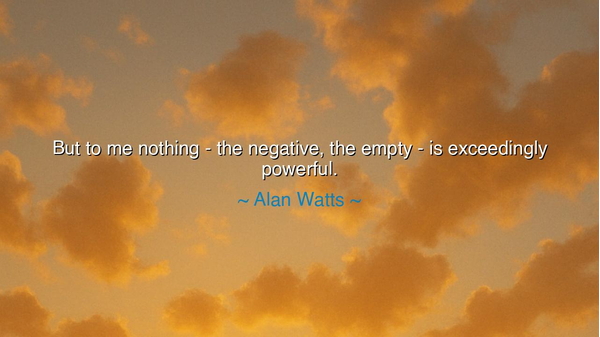
But to me nothing - the negative, the empty - is exceedingly






The philosopher and mystic Alan Watts, a bridge between Eastern and Western thought, once spoke a paradox that humbles the mind: “But to me nothing—the negative, the empty—is exceedingly powerful.” At first, these words seem strange, for how can nothing, a void, possess power? Yet Watts draws from ancient wisdom, teaching that in the great dance of existence, the unseen and the unformed hold infinite potential. The empty is not mere absence, but the fertile space from which all creation is born.
In many traditions, nothingness is sacred. In Taoist thought, the usefulness of a vessel lies in its emptiness; a cup holds water only because it is hollow. Likewise, the stillness of a quiet mind allows truth to enter, while a mind cluttered with noise cannot perceive reality. Watts reminds us that the negative, the space we often fear or overlook, is not weakness but hidden strength. It is the pause between notes that creates the music, the silence between words that gives language its meaning.
Consider the wisdom of Laozi, who taught that the soft and yielding overcome the hard and unbending. A river, though formless and flowing, carves mighty valleys and wears down stone. This is the power of the empty: it does not resist, yet it transforms. Watts echoes this ancient truth, showing that by embracing nothingness, we align ourselves with the infinite potential of the universe. To cling only to the tangible and the filled is to miss the deeper rhythm of life.
History also reveals this principle in human events. During the struggle for India’s independence, Mahatma Gandhi wielded the power of nothingness through nonviolence. By refusing to strike back, by leaving a space where aggression could not take root, he created a moral force greater than armies. His seeming emptiness—his refusal to meet violence with violence—became a vast, silent strength that ultimately brought down a mighty empire. The negative, in this case, proved more potent than the sword.
Let this teaching be passed down: do not fear emptiness, for it is the womb of possibility. In times of chaos, silence is a shield. In moments of conflict, yielding is the hidden weapon. As Watts understood, the power of nothing lies in its freedom. It cannot be grasped, defeated, or destroyed, for it is the space that holds all things. To recognize this is to see the universe not as a battlefield of forces, but as a boundless dance of presence and absence, where the empty is never truly void, but the source of endless creation.






THcao thi hai
This quote hits me as deeply philosophical but also emotional. It’s as if Watts is saying that what we perceive as void is actually the source of balance and energy. That challenges how we approach grief, solitude, or failure—they might not be empty after all. I’d love to ask: is he describing a spiritual truth, a psychological insight, or both? Perhaps the negative isn’t destructive, but deeply regenerative.
HD05. Tran Nguyen Hong Diep
To me, this idea is both comforting and mysterious. It suggests that the empty spaces in life—loss, stillness, even confusion—carry their own form of wisdom. I wonder if Watts was referring to spiritual emptiness, like the Buddhist concept of ‘nothingness’ as clarity and unity. It’s such a paradox: the negative that creates the positive. Maybe the true power of nothing lies in how it makes room for everything else.
DGBui Duc Giang
This statement really makes me question how we define value. Watts seems to celebrate the void as a kind of hidden force, which feels both unsettling and beautiful. It reminds me of how we fear boredom, silence, or uncertainty—when maybe those are the very states that teach us the most. Do you think the modern world has lost the ability to appreciate emptiness, constantly trying to fill it instead?
PMnguyen Phuong Mai
I find this quote fascinating because it flips our usual understanding of strength. We tend to associate power with presence, action, or substance, yet Watts finds it in absence. It makes me think about silence, rest, and the space between thoughts. Could it be that ‘nothing’ allows meaning to exist, the way pauses give shape to music or words? Maybe emptiness isn’t weakness at all, but the foundation of everything real.
HLTran Nhu Hoang Linh
This quote feels profoundly Zen, like something that invites you to rethink what ‘nothing’ actually means. Watts seems to suggest that emptiness isn’t a void but a source of potential. That really challenges Western ideas about absence being negative. I wonder—does embracing nothingness mean detachment from desire, or simply recognizing the power of stillness and space? Maybe true creativity and peace come from learning to value emptiness instead of fearing it.